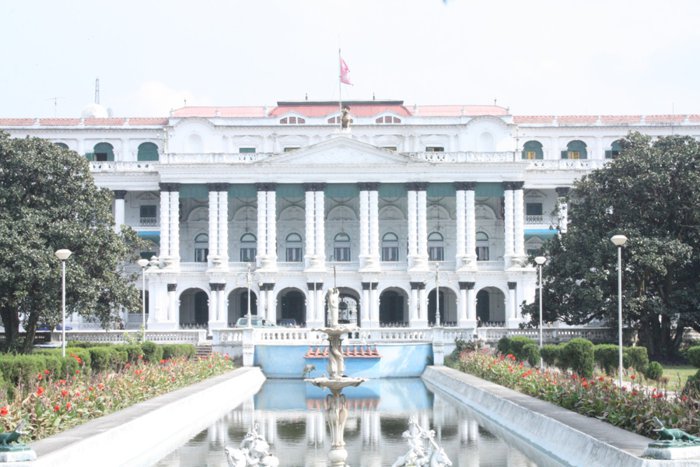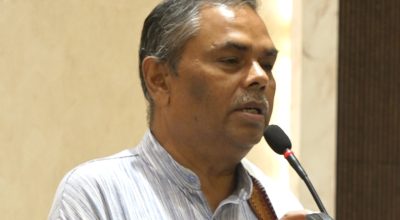
Narayan Prasad Ghimire
Kathmandu, June 25 : On June 12, Deputy General Secretary of CPN UML, Prithvi Subba Gurung, proposed the reduction in number of federal ministries from the existing 25 to 12.
During deliberations on the Appropriation Bill underway in the House of Representatives, the ruling party leader demanded downsizing the number of federal ministries in line with the recommendation of a report furnished by the Administrative Reform Commission.
The leader also wanted to have a cut in numerous departments, and district coordination committees to suit the federal context. Earlier, in an interview to a national daily, the Kathmandu Post, leader Gurung had vocally criticized the political leaders’ attitude, claiming it hostile to federal spirit and provisions. He blamed the centralist mindset of the political parties behind a sluggish enforcement of federalism which we adopted long back, 16 years over.
Similarly, Nepali Congress General Secretary and seminal leader Gagan Thapa expressed a similar view of giving a severe cut in the outsize centralized governance by reducing ministry numbers and other institutions. As the leaders have expressed, the enormous government in the central level has not only drained state coffers but also dented badly federal pursuit. In the wake of a low capital formation in the country, constant proposals for foreign aids with development partners, compulsory inflow of remittance by the Nepalis engaged in backbreaking jobs abroad, declining agricultural products and skyrocketing trade loss and public debt, thereby pushing the national economy to a fragile state, keeping a humongous administrative structure in the centre and usurping treasury continuously must have been taken seriously. But it vanished in the thin air.
In order for the federalism to sustain effectively and deliver to the people’s needs and aspirations along with intensification of development activities and governance reform together, the local and provincial levels are expected to build themselves as ones’ own economic identities. But, the dearth of identification of available resources and capital formation is so poor that they largely depend on what the central government coughs up. They prepare their budgets after the presentation of federal budget.
Worryingly, even in the federal context, the budget-making still adopts a top-down approach, which we decried for a long in the unitary system. It is the mighty remnant of the previous system. If we do not prepare the budget adopting the bottom-up approach where the issues and concerns of the local and provincial levels become frontiers, it is nothing but the hangout of the previous system. It is interesting and contradictory as well that politicos criticize the previous centralized system while hailing the achievements of the present system, but remain almost mum to shun the same centralized attitude that ignored people’s aspiration with real devolution of power for centuries. So, reflecting federalism in practice is the utmost need of h/ours.
Capacitate sub-national governments
In addition to the economy that needs to take care of the sub-national governments first, other areas also need for building capacity at lower levels. Several researches have shown how pathetic the sub-national governments are in terms of their capacity to exercise their rights. Many people’s representatives at local levels are almost unaware of their rights. At a time when it is urgency to create jobs at local levels through skilled-based training to retain youths, best utilize available resources, identify needs and harness indigenous knowledge and skills from the senior citizens and utilize them for the broader welfare of the concerned levels, the dearth of knowledge among peoples’ representatives about the constitutionally guaranteed rights is a severe setback to local governments.
An equally important need is to equip the local levels with skilled workforces. Several local levels are bound to deliver with minimum employees. Both the people’s representatives and employees’ sufficient knowledge of constitutional provisions would help them cater public services and advance development works accordingly.
Banish corruption
The slogan of ‘Gaugauma Singha Durbar’ to mention local governments full of rights is further marred by corruption. The governance experts have often warned of federalism turning into the ground of decentralized corruption. As they have argued the corruption, nowadays, is flared as a wildfire in cahoots with people, political leaders and bureaucrats, which is difficult to rupture. Time has come to hone the watchdog role of the public institutions, CSOs and media to keep tabs on the public agencies and politicos.
Federalism is a hard-fought governance shakeup that warrants contributions from various sides with utmost honesty and integrity. But if the same unitary ills are perpetuated in this new system, how can a just and equal society and economic progress be realized in h/ours’ time? Empowering sub-national governments is at the heart of effective enforcement of federalism. For it to happen, the centralized attitude must be ditched. #nepal #rss












